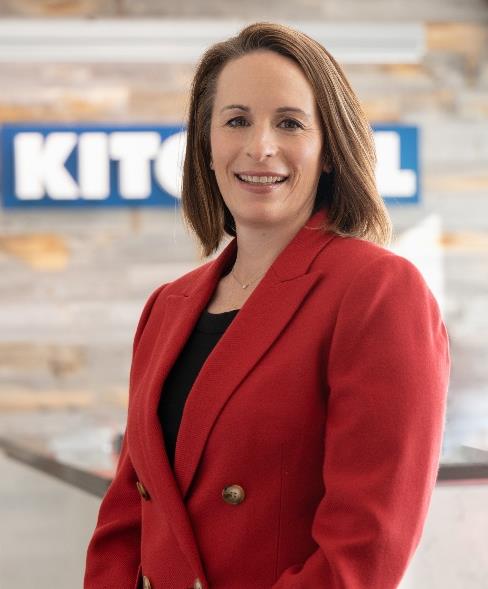Describe your journey in the construction industry and how you became President & CEO of Kitchell.
I’ve always been interested in the way things are built, and originally wanted to go into architecture. When I was young, my dad was a laborer for an underground utility construction company. When I was 7, he left his job and started his own construction company out of our house, and he and my mom successfully operated that company for 25 years. I had a lot of exposure to the industry and fell in love with it. Fortunately, I realized in high school that architecture wasn’t where I should be, but I still gravitated toward building. My first job in the construction industry was working as a project secretary (a term not used anymore) at a project site in San Luis Obispo, CA. From that point on, I was hooked and the rest of the story is history.
In a traditionally male-dominated industry, what challenges have you faced as a woman rising through the ranks and how did you overcome them?
There are so many challenges that all of us face as we grow throughout our careers in any industry. Over the last 25 years, so many things have changed and evolved. I do have so many formative experiences from my early career. What I remember most is those people that took me under their wing and really supported me, challenged me and encouraged me to be my best. In many cases, the individuals that I learned the most from were the superintendents in the field who came with decades of lessons learned under their belt and a direct approach that never left you wondering how they felt.
As President & CEO, how do you foster DEI within Kitchell, especially when hiring, promoting and supporting female professionals?
One of our major focuses is filling the anticipated void of baby boomers who are exiting the industry. The construction industry is facing an unprecedented labor shortage that really started in 2008 and has continued to grow. Some studies have estimated that there is a shortage of 1 million workers in our industry. I strongly believe that the solution to this labor shortage can be addressed by attracting a diverse group of talent from professionals to skilled tradespeople to our industry.
We have a broad recruiting strategy that includes a diverse group of schools with the intent of ensuring our workforce reflects the communities where we work. This past year summer, we had 40 interns from across the country. This was our most diverse group of interns to date.
Another thing we’re doing – which is a longer runway – is trying to inspire young people to pursue careers in the building industry. We started a program in Sacramento, which we’re hoping to expand to other markets, called Hard Hat Scholars. It introduces high schoolers from underrepresented communities to careers in the architecture, engineering and construction industry through one-on-one interactions with mentors, jobsite tours and workshops. So far, we’ve had 40 students graduate the program in the last two years. This program offers scholarships to all our graduating scholars and offers junior internships to those who apply. We look forward to continuing to expand this program in the future.
How does having more women in leadership positions benefit the construction industry as a whole?
I am a strong believer in diversity of thought. Diversity of thought comes from having a diverse team that come from different backgrounds, life experiences and industry experience. The diversity of team promotes innovative thinking that in turn benefits our clients and the communities where we live and work.
How is Kitchell embracing technology and how do these changes influence gender dynamics within the sector?
It’s interesting that construction is generally regarded as one that is not technologically advanced, but that is rapidly changing. The amount of investment and focus on emerging technology in the construction industry has ramped up significantly in the last decade. One of the biggest challenges that our industry faces is low productivity compared to other industries and rising costs. I see innovation, not only technology, as a critical element to the success of the construction sector in the coming decade.
I think that the increase in technology really opens the door for the workforce in the industry to evolve. We have a generation in the workforce now that is more adept than ever at using technology and virtual reality and we are just starting to explore where AI may take the industry, which is very exciting.
What advice would you give to young women considering a career in construction?
Do it. The opportunities are limitless. This is an industry that has a great need at all levels and skillsets no matter what your background might be. There are so many diverse opportunities and career paths within the industry that there is something for everyone.
What do you envision for the future of women in the construction industry?
The sky is the limit.


